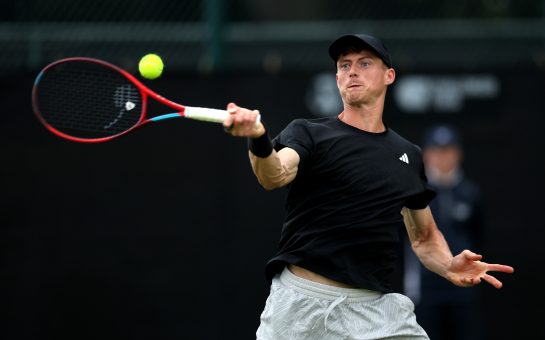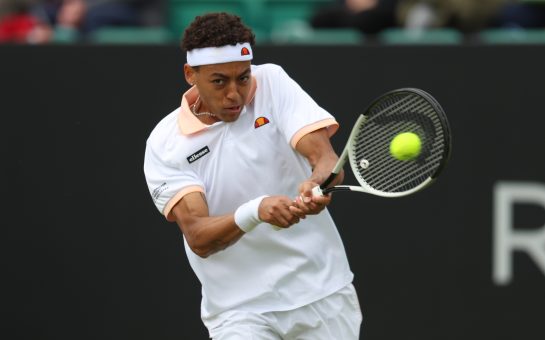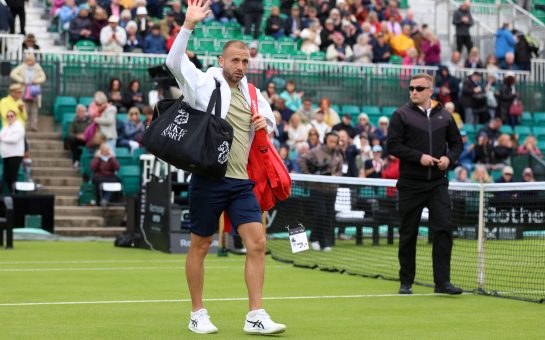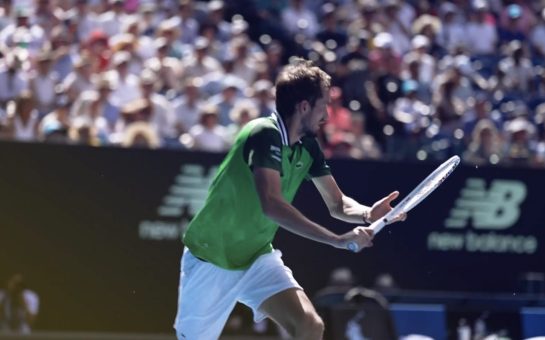Cutting it a little close, due to an unfortunately timed drugs test, Wimbledon champion and British tennis hero Andy Murray made it to Buckingham Palace just in time to collect his OBE from Prince William last week.
After winning gold at the Olympics in 2012 and being crowned US Open champion in the same year, Murray was a shoe-in for the award, being nominated even before his Wimbledon triumph.
There is, however, a bone of contention with many regarding the profusion of benefits already given to (or earned by, depending on your side of the fence) sports stars and celebrities.
Indeed, many potential recipients have rejected such honours, believing the system to uphold the out-dated imperial values of stringent class distinction, thereby inhibiting the potential for a fairer society.
Artist L. S. Lowry notoriously declined honours five times, Danny Boyle famously said he wanted to remain “a man of the people”, after refusing an honour following his efforts at the Olympics, and popular figures such as Bill Nighy, Dawn French, Jon Snow, and Nigella Lawson have all snubbed offers to be made officers of the British Empire.
Perhaps the now superfluous quality of royal honours for the rich and famous plays a part in this. Murray received $2,600,000 (£1,609,808.20) following his crowning glory in America. He trained very hard, and it was clearly a difficult match (beating Novak Djokovic in four hours 54 minutes), but many would argue the trophy – and of course the money – is reward enough. An OBE as well? Perhaps a little over the top.
Detractors would also argue that the flood of sporting honours was to be expected after the success London 2012. Rower Ben Ainslie and cyclist Bradley Wiggins both received knighthoods and Paralympic cyclist Sarah Storey was made a dame, while Jessica Ennis, Mo Farah, Victoria Pendleton, David Wier, and Katherine Grainger all received OBE’s.
Such views are held by co-founder of Action for Sick Children, Pamela Barnes, who was recently honoured with an MBE for her services to child health and education.
“Sometimes people just get them for doing their jobs and I’m not too sure that this is right,” she said.
“There is a group that are awarded for being in their job for a long time and why should they get it? What they do isn’t voluntary.”
It would be easy to say that such reward-happy honours were a bi-product of the Olympic fervour for success, but it would also be inaccurate.
The 2013 New Year’s Honours List was not solely given over to home-grown Olympians, but featured illustrator Quentin Blake, ministerial adviser on adoption Martin Narey, and principal and vice chancellor of the University of Aberdeen Professor Ian Diamond, among other’s equally deserving of acclaim for their invaluable work in the United Kingdom.
It would also be a mistake to think any of the above named sportsmen and women were recognised for their sporting accomplishments alone. Mo Farah has his own foundation, which provides aid to East Africa, as has Bradley Wiggins, who promotes participation in sport, and Jessica Ennis supports The Children’s Hospital Charity and Weston Park Hospital Cancer Charity.
Similarly, Andy Murray is a member of the leadership council for Malaria No More UK. Launched in 2009 with David Beckham, this charity is dedicated to preventing the number of deaths caused by this treatable disease – a staggering figure of one African child every 60 seconds.
Murray also supports Sport Relief, RED, the Global Fund, and the Make a Wish Foundation, and champions the causes of AIDS HIV, cancer, children, conservation, education, environment, fair trade, health, human rights, hunger, literacy, poverty and women’s rights.
This seemingly one-dimensional tennis player is undeniably active in the realms beyond his rigorous training routine.
In 2011 he took part in the Rally for Relief charity event, and this year’s Rally Against Cancer, saw his coach and eight-time grand slam champion Ivan Lendl, former British no. one Tim Henman, and then world no. six Tomáš Berdych, play to raise money for the Royal Marsden Cancer Charity.
All of the prize money Murray won after his victory at the AEGON Championships (around €80,000/£67,673.28) was donated to this charity, following the diagnosis of his best friend, Ross Hutchins, with Hodgkins Lymphoma.
Beyond charitable work, the impact Murray and his sporting colleagues have had on the future of British sport is unfathomable. The last British man to win the US Open was Fred Perry in 1936. Murray is also the first British man in 77 years to win the Wimbledon men’s singles title.
Achievements like these, and of course the clutch of 65 medals at the Olympics, surely promise to inspire a generation, and, naturally, where sporting contests are held, the concomitant sporting tourism can never be far behind.
It is, therefore, not for his skill with a racquet that Andy Murray is recognised and rewarded, but for his service to the United Kingdom and its people; that is, after all, what the OBE is all about.
In recognition of her services to children and families, founder and chairman of the Bolton Toy Library, Elizabeth Tatman, was also on this year’s Queen’s Birthday Honours List.
She told MM: “When anybody gets nominated I know for a fact that your nomination has to be accompanied by supporting letters from people saying nice things about you. The criteria are exactly the same for everybody and we are all in the same boat.
“At the Olympic Games lots of people were nominated because they brought Great Britain to a high profile.”
Created in 1917 by George V, the Order of the British Empire was originally intended to recognise a person’s contribution to the war effort. From 1918, however, there have been military and civil divisions in the Order, as the king felt it was important to reward services to the state in a much broader sense.
Such diversity is reflected in the 100,000 living members of the Order throughout the world, with new additions in the New Years and Queen’s Birthday Honours Lists. This year’s recipients are as varied as they come, with OBE’s going to Dana Ross-Wawrzynski, executive head teacher of Altrincham Grammar School for Girls, and leader of Lancashire County Council, Geoffrey Driver.
Dr Jacqueline Christodoulou, chief executive of The Safety and Reliability Society, shares this list as a result of her MBE for services to vulnerable people.
“I’m just an ordinary person from Oldham; just a working class person with three children,” she said.
“I have a pretty good job now, but I haven’t always, so I’m not a famous person in any way.
“But it has changed the way people perceive me. A group of school children came up to me in the street and said well done. That was really nice.
“Afterwards I researched people in my area and I found out that quite a lot of people working in the community have been honoured.”
In the wider sense of fame and celebrity, relatively unknown people such as this will join the ranks of Dame Maggie Smith and Sir Peter Fahy, as will recipients of the Officer OBE following their nomination this year.
Former managing director of Rugby Football Union for Women, Rosemary Williams, co-founder of Growing Against Gangs and Violence, Nicholas Mason, and professor in gastrointestinal epidemiology at Imperial College London, Wendy Atkin, are just three of the 225 invested officers of the 2013 Queen’s Birthday Honours List, all from very different backgrounds, who are being honoured, much like their celebrity counterparts (this time including sports presenter Clare Balding), for services to Great Britain.
Andy Murray’s investiture is common knowledge because it’s subject to a great deal of press coverage, and this perpetuates the belief that only famous people receive honours.
Nevertheless, valuable service is the only criterion for the award, meaning that the Order is now used to reward service in an enormous variety of activities. Indeed, the OBE aims to ensure that large numbers of people who provide valuable services, but who are not often in the public eye, are recognised.
What many people don’t know is that anyone in the UK can make a recommendation for a British national to receive an honour.
As a result of this a huge range of people are recognised every year, from charity volunteers, members of the emergency services or Armed Forces, industrial pioneers or specialists in various professions, and, yes, the celebrities everyone hears about the most.
Of course, comparatively few people will ever experience the thrill of receiving a letter alerting them to their impending investiture, much less the ceremony itself. There is, however, an expected sense of trepidation, and this extends right across those awarded, from head teachers to world-renowned actors.
Dr Christodoulou told MM: “I got the letter six weeks before it was publicly announced and I was told to keep it a secret, which was really difficult. I rang up to make sure it was definitely me.
“Because I’m just an ordinary person. Going to Buckingham Palace with famous people is a bit of a concern. I’m sure it will be fine.”
Similar feelings were expressed by Mrs Barnes. She said: “Sitting on it is a very funny experience but it is very exciting as well. I am enjoying it and I am looking forward to going to the palace.”
Yet there is also an enormous measure of gratitude felt by all those honoured. Mrs Tatman told MM: “I am the one with letter after my name because the organisations have been part of it. Ordinary people feel they don’t stand alone. They are part of a community.”
Image courtesy of British Ceremonial Arts, with thanks
For more on this story and many others, follow Mancunian Matters on Twitter and Facebook.



